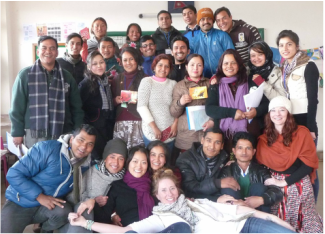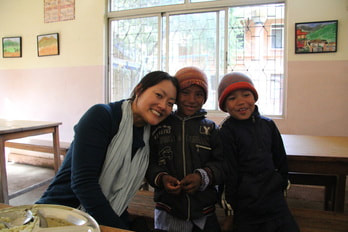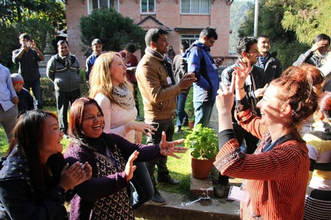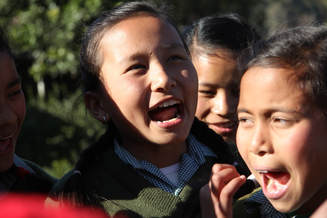|
Last Tuesday, I returned from Nepal where I spent almost three weeks helping to oversee our trauma healing training, photography, music, and LEGO projects at Bright Horizon Children's Home. My experience was transformational, heart-opening, and deeply meaningful (project update coming soon). And yet, sitting in my comfortable, heated home in San Francisco for the past week, I've felt a sense of melancholy. I get this way every time I return from field work abroad. I've written about this phenomenon before. I've warned volunteers about it. I commiserated with co-founder Elayne about it on the phone last week. Still, it always surprises me when it happens. Like when I returned from field work in Cambodia a few years ago and drove straight to the French Alps the next day, only to sit in the snow at the top of a ski lift, tears streaming down my face, wondering what in the world all these people were doing gliding on sticks down the mountain. This time, the feeling hit me like a freight train. It's hard to describe it. It starts with overwhelming gratitude as I arrive at home, take a long hot shower, then sleep soundly in my warm, fluffy bed - in contrast to the freezing cold bed where I slept at the children's home, snoozing every night under three layers of heavy blankets, fully clothed in thermals, slippers, scarf, gloves, and beanie (those conditions were quite posh compared to the way most in Nepal live). I couldn't muster the energy to shower every day (or even every other day). The icy water was unbearable when the power was out; the hot water supply was limited. Then, it shifts to sadness. As I look around me at all the people innocently going about their daily routine, I feel confused. I want to shout: Do you understand that half the world lives in poverty? Do you know that many of our fellow humans, including little children, are often abandoned, persecuted, left for dead, or even killed because of their gender, faith, or caste? Do you know that you hit the jackpot being born in ________ [insert: any developed country in the world]? I wonder, how can the rest of the world continue about their day unknowingly while this terrible injustice of humanity rages on? And, what does it mean that I am also guilty of living mindlessly, coveting material things, not giving thought to others in the world? At the same time, I feel sorrow that so many people will never see or experience the heart-opening love that I was honored to witness in Nepal. I listened to a student talk about how the oxygen of his breath in deep meditation is like a medicine he gives to his mother. I saw a teacher apologize if he ever unknowingly hurt another person after learning about the definition of abuse. I observed the teachers making human statue examples of what an empowered person looks like, from one teacher standing with palms facing up, saying "thank you, thank you, thank you" to two male teachers courageously demonstrating a loving embrace. And, I danced, sang, and celebrated our aliveness with teachers, staff workers, and children throughout our stay. Many dancing and singing parties throughout our stay In those moments, my heart grew bigger. My hope for humanity grew stronger. And, the joy I felt was both peaceful and euphoric - it was a knowingness of what truly matters that the rest of the world living in fragile settings knows best: community, laughter, sharing, compassion, and a sense of oneness with all beings in this universe.
And so, I cry. I feel ashamed of my material life. I feel guilty about every time I've moved through the world mindlessly. I feel like an alien living in two parallel universes, unable to reconcile them, unsure how to live my daily life after seeing what I've seen and experiencing what I've experienced. And then something happens to lift me out of my inner darkness. This time, it was a deep, meaningful conversation last night over a delicious Nepalese meal (momos, of course) with a beautiful Tibetan family who've sought refuge here in the Bay Area, recently reuniting after political persecution in Tibet and in their adopted land of Nepal separated their mother, father, and four children for 10 years. We talked about many things - compassion towards others and self, the sad reality for Tibetans in Nepal, and how grateful they are to have so many freedoms here in America. Whereas I thought my problem was complex, the answer was simple. Connection to things in life that matter and to people who practice gratitude for them was the medicine I needed to come home in my mind, not just in my body, and continue living my own mantra for a good life: compassion, gratitude, and paying it forward. Knowing I should be grateful was not enough. But truly feeling it in the deepest part of my heart is what transformed me and what will help me play a small role in transforming the lives of others. I am grateful.
1 Comment
Leave a Reply. |
|
© Copyright 2023
|




 RSS Feed
RSS Feed